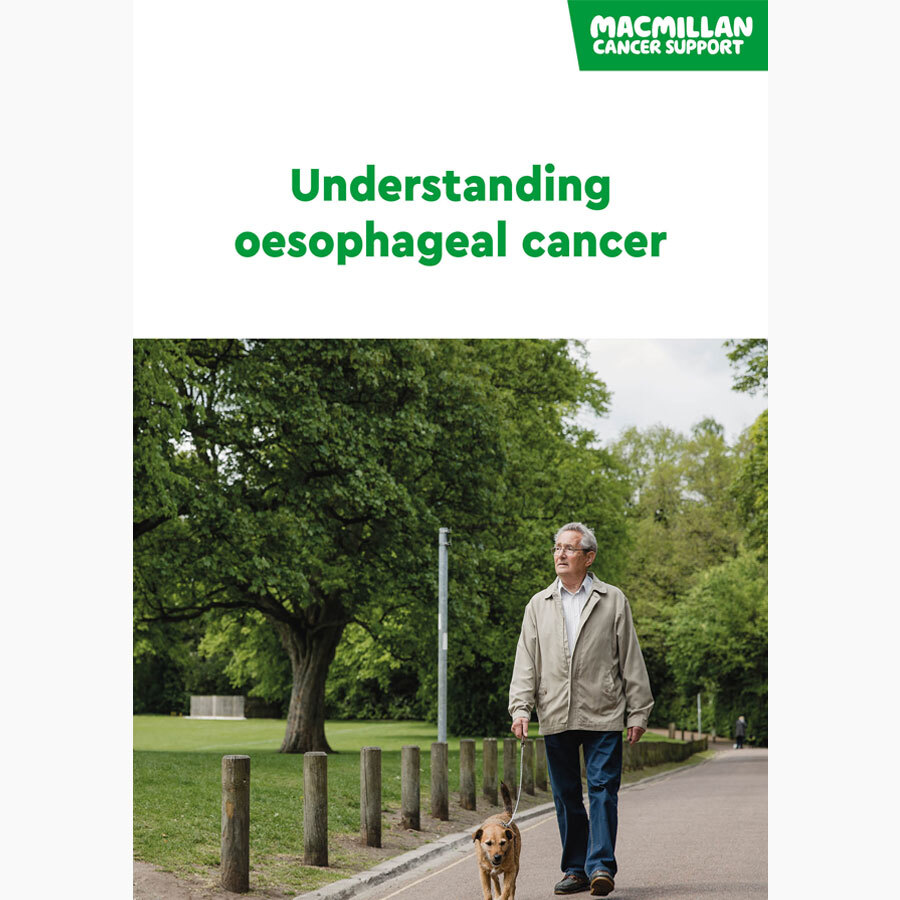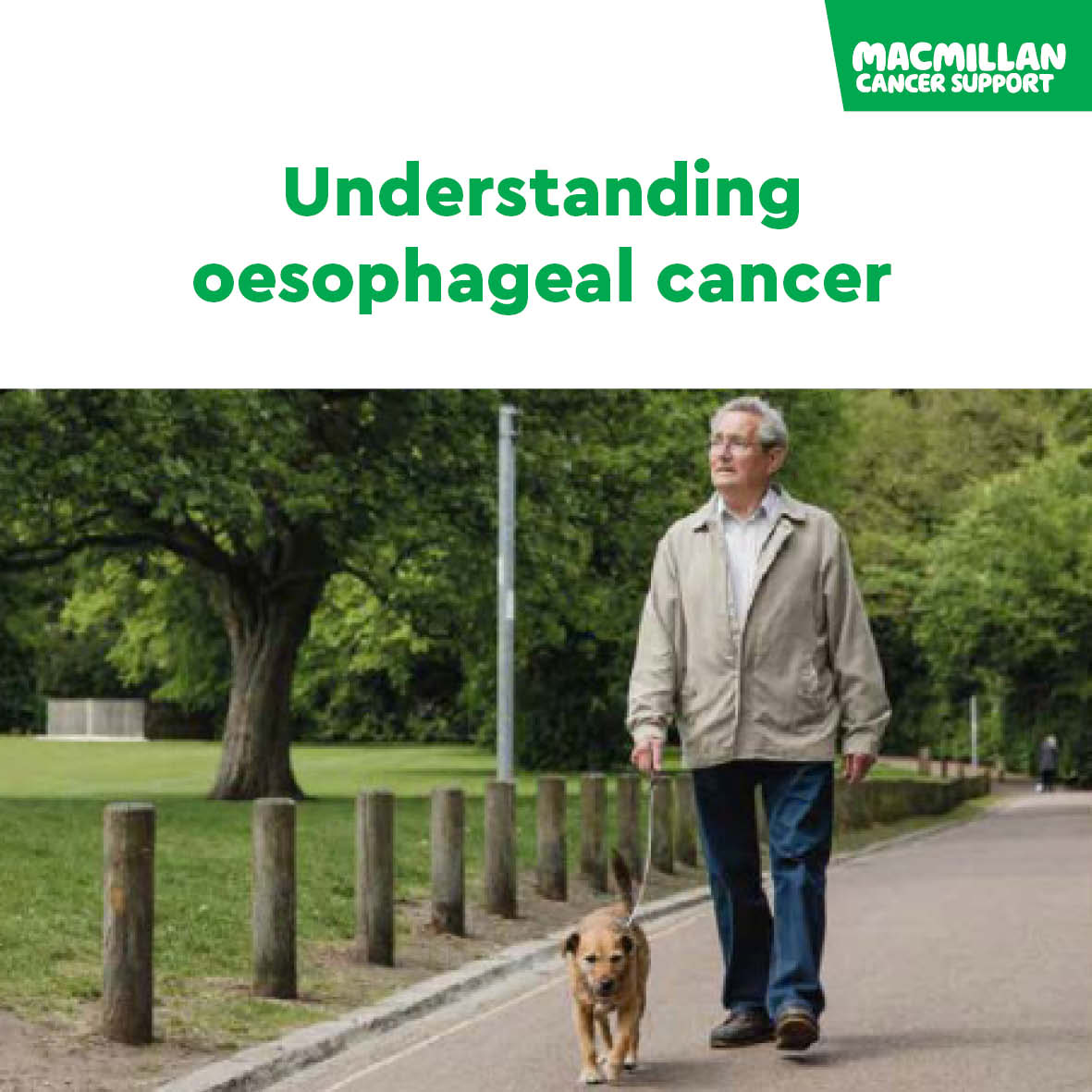What is oesophageal cancer?
The oesophagus (gullet) is part of the digestive system, which is sometimes called the gastro-intestinal or GI tract. The oesophagus is a muscular tube that goes from the mouth down through the chest to the stomach.
In the UK, around 9,000 people are diagnosed with oesophageal cancer each year.
Booklets and resources
Types of oesophageal cancer
Knowing the type of oesophageal cancer helps your cancer doctor plan your treatment.
There are 2 main types of oesophageal cancer:
- Squamous cell carcinoma develops in the thin, flat cells of the mucosa, which lines the oesophagus.
- Adenocarcinoma develops from glandular cells and is often linked with Barrett’s oesophagus.
Cancer can develop anywhere in the oesophagus. Cancers in the upper or middle oesophagus are usually squamous cell cancers. Cancers in the lower oesophagus are usually adenocarcinomas. This includes cancers that develop in the gastro-oesophageal junction (GOJ). This is where the oesophagus joins the stomach.
are other, rarer types of oesophageal cancer. These include:
- neuroendocrine cancer, including small cell cancer
- soft tissue sarcomas, such as gastro-intestinal stromal tumours (GISTs)
- oesophageal melanoma.
The tests and treatments for these rarer types of oesophageal cancer are different from the ones we describe in this information. They are specific to each type of oesophageal cancer.
If you would like more information about this, you can:
- Call the Macmillan Support Line for free on 0808 808 00 00 to talk to a cancer information specialist.
- Chat to our specialists online.
Related pages
Symptoms of oesophageal cancer
The most common symptom of oesophageal cancer is difficulty swallowing. You may feel as though food is sticking in your throat or chest. This symptom can be caused by other conditions other than cancer. But it is important to get it checked by your GP. They can arrange tests or refer you to a specialist if necessary.
If you are worried about oesophageal cancer we have more information about the signs and symptoms.
Related pages
Causes of oesophageal cancer
Certain things can increase the chance of developing oesophageal cancer. These are called risk factors. Having a risk factor does not mean you will definitely get oesophageal cancer. Or if you do not have any risk factors, you may still be diagnosed with oesophageal cancer. We do not yet know why only some people who have risk factors develop oesophageal cancer.
Oesophageal cancer is not infectious and cannot be passed from one person to another.
We have more information about the causes and risk factors of oesophageal cancer.
Diagnosis of oesophageal cancer
You usually start by meeting your GP. They will ask about your symptoms and examine you. You may have blood tests to check your general health. If your GP is not sure what the problem is, or thinks you may have cancer, they will refer you to hospital for a test called an endoscopy.
If your GP thinks you may have cancer, they will make an urgent referral for an appointment. This means your GP is asking for a specialist appointment for you within 2 weeks or as soon as the clinic can arrange it.
Tests for oesophageal cancer
The main test used to diagnose oesophageal cancer is an endoscopy. An endoscopy is a test to look at the lining of the oesophagus, stomach and the first part of the small bowel (the duodenum). Endoscopies can also be used to give treatment.
At the hospital
If the biopsy results from the endoscopy show there are cancer cells, your specialist doctor will arrange more tests. The tests may include the ones we describe in this section. These are to find out:
- which layers of the oesophageal wall the cancer is in
- whether the cancer has spread outside the oesophagus.
These tests may include:
-
CT scan
A CT scan makes a detailed picture of the inside of the body. The picture is built up using x-rays taken by the CT scanner. The scan uses radiation, but this is very unlikely to harm you. It will not harm anyone you come into contact with.
-
PET-CT scan
A PET scan uses a low dose of radiation to check the activity of cells in different parts of the body. You may have a PET scan and a CT scan together. This is called a PET-CT scan It can give more detailed information about cancer or abnormal areas seen on other scans.
-
Endoscopic ultrasound (EUS)
An endoscopic ultrasound is like an endoscopy, but the end of the endoscope has an ultrasound probe on it. The probe uses sound waves to produce an image of the wall of the oesophagus and surrounding area.
-
Laparoscopy
A laparoscopy is a small operation used to look at organs inside your tummy (abdomen). The surgeon uses a thin tube with a camera on the end, called a laparoscope. They may also take biopsies.
Waiting for test results can be a difficult time, we have more information that can help.
Related pages
Staging and grading of oesophageal cancer
Your cancer doctor needs information about the cancer to advise you on the best treatment for you. This includes the cancer’s:
- stage, which describes the cancer and whether it has spread
- grade, which gives an idea of how quickly the cancer might grow and spread.
Your cancer doctor can use the results of your tests to try to identify the stage of the cancer. They will do this before your treatment is planned to help decide the best treatment for you. But they may not know the exact stage of the cancer until it has been removed with surgery.
We have more information about staging and grading.
Treatment for oesophageal cancer
A team of specialists will meet to discuss the best possible treatment for you. This is called a multidisciplinary team (MDT).
You might have treatment to cure the cancer. If a cure is not possible, the aim of treatment is to control the cancer and help with the symptoms.
Your treatment for oesophageal cancer depends on:
- the type of oesophageal cancer you have
- where the cancer is in the oesophagus – in the upper, middle or lower oesophagus
- the stage and grade of the cancer
- your general health and level of fitness
- your personal choices.
Your cancer doctor or specialist nurse will explain the different treatments and their side effects. They will also talk to you about things to consider when making treatment decisions.
You can read about when different treatments are given in our treatment overview. These treatments may include:
-
Surgery
Surgery can be used to remove the cancer or relieve symptoms.
-
Chemotherapy
Chemotherapy uses anti-cancer drugs to destroy cancer cells. It can be given before and after surgery. It can be given on its own, with radiotherapy (chemoradiation) or with targeted therapy. It may also be used for people who cannot have surgery.
-
Radiotherapy
Radiotherapy uses high-energy rays to treat cancer. It may be given in combination with chemotherapy (chemoradiation). If the cancer is more advanced, you may have radiotherapy on its own to shrink the tumour and help control symptoms.
-
Chemoradiation
Chemoradiation is when you have chemotherapy and radiotherapy together. Chemotherapy can make the cancer cells more sensitive to radiotherapy treatment.
-
Targeted therapy
Targeted therapy drugs work by targeting something in or around the cancer cell that is helping it grow and survive. Sometimes a targeted therapy drug called trastuzumab
-
Immunotherapy
Immunotherapy is used to treat some people with oesophageal cancer. You may be have it to reduce the risk of cancer coming back after treatment. Nivolumab or pembrolizumab are sometimes used. You may be offered immunotherapy as part of a clinical trial.
The treatments can be used alone or in combination with each other. Your cancer doctor and specialist nurse will explain the treatments they think are best for you. They can help you make decisions about your treatment.
You may also have treatments as part of a clinical trial.
Related pages
Treating advanced oesophageal cancer
Cancer that started in the oesophagus and has spread to other parts of the body is called advanced oesophageal cancer. The cancer may be advanced when it is first diagnosed. Or it may have come back after treatment. This is called recurrent cancer.
The main problem for people with advanced oesophageal cancer is difficulty swallowing.
If you have advanced oesophageal cancer, you may be offered treatment such as chemotherapy, radiotherapy or targeted therapies. These treatments will not cure the cancer, but they may be able to shrink it. This may control it for a time and improve symptoms, such as difficulty swallowing.
After oesophageal cancer treatment
After your treatment has finished, you will have regular follow-up appointments. Depending on what treatment you had, you may have an endoscopy or a scan as part of your follow-up care. You will usually talk with someone from your healthcare team at the appointment. This may be your surgeon, cancer doctor, specialist nurse or another health professional.
You may get anxious between appointments. This is natural. It may help to get support from family, friends or a support organisation.
Macmillan is also here to support you. If you would like to talk, you can:
- Call the Macmillan Support Line for free on 0808 808 00 00 to talk to a cancer information specialist.
- Chat to our specialists online.
- Visit our oesophageal cancer forum to talk with people who have been affected by oesophageal cancer, share your experience, and ask an expert your questions.
Eating after treatment for oesophageal cancer
It can take a few months to recover from treatment for oesophageal cancer. And it may take up to a year to adjust to the changes in your digestive system.
We have more information and advice about eating after treatment for oesophageal cancer and about dumping syndrome.
Well-being and recovery
Even if you already have a healthy lifestyle, you may choose to make some positive lifestyle changes after treatment.
Making small changes such as keeping active can improve your health and wellbeing and help your body recover.
Related pages
About our information
This information has been written, revised and edited by Macmillan Cancer Support’s Cancer Information Development team. It has been reviewed by expert medical and health professionals and people living with cancer.
-
References
Below is a sample of the sources used in our oesophageal cancer information. If you would like more information about the sources we use, please contact us at informationproductionteam@macmillan.org.uk
European Society for Medical Oncology. Oesophageal Cancer: ESMO clinical practice guidelines for diagnosis, treatment and follow up. 2022. Available from www.esmo.org/guidelines/guidelines-by-topic/gastrointestinal-cancers/oesophageal-cancer [accessed July 2023].
National Institute for Care and Health Excellence. Oesophago-gastric cancer: assessment and management in adults NICE guideline [NG83]. 2018. Available from www.nice.org.uk/guidance/ng83 [accessed July 2023].
Dr Chris Jones
Reviewer
Speciality Registrar in Clinical Oncologist and Clinical Lecturer in Clinical Oncology
Date reviewed

Our cancer information meets the PIF TICK quality mark.
This means it is easy to use, up-to-date and based on the latest evidence. Learn more about how we produce our information.
The language we use
We want everyone affected by cancer to feel our information is written for them.
We want our information to be as clear as possible. To do this, we try to:
- use plain English
- explain medical words
- use short sentences
- use illustrations to explain text
- structure the information clearly
- make sure important points are clear.
We use gender-inclusive language and talk to our readers as ‘you’ so that everyone feels included. Where clinically necessary we use the terms ‘men’ and ‘women’ or ‘male’ and ‘female’. For example, we do so when talking about parts of the body or mentioning statistics or research about who is affected.
You can read more about how we produce our information here.






